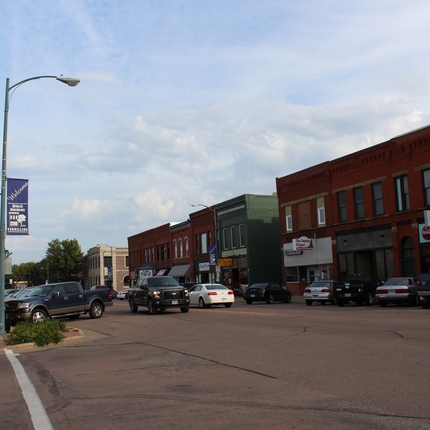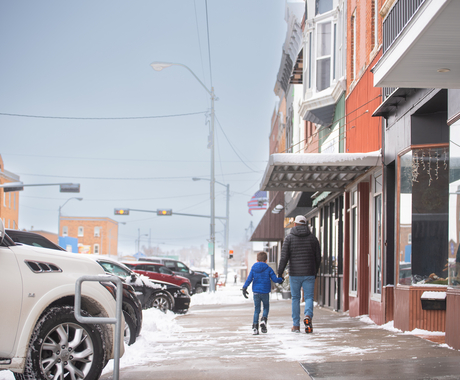By Johnathan Hladik, former policy director
As lawmakers consider legislation to address the economic fallout of the coronavirus pandemic, a group of 65 small business lenders, including the Center for Rural Affairs, across 32 states are calling on Congress to treat rural and urban businesses equally when it comes to providing relief.
In a letter to Congress, the group is requesting that any new legislation to address the coronavirus pandemic include six months of principal, interest, and fee payment relief for Rural Microentrepreneur Assistance Program borrowers, similar to that already granted to businesses who borrow through Small Business Administration.
“We believe these small business borrowers should be treated equally,” said Johnathan Hladik, policy director with the Center for Rural Affairs. “The majority of these business owners are in the service industry, which has been severely damaged by the coronavirus pandemic. They should not be ignored just because they are rural.”
Senator Mitch McConnell
Senate Majority Leader
317 Russell Senate Office Building
Senator Charles E. Schumer
Senate Minority Leader
322 Hart Senate Office Building
Senator Richard C. Shelby
Chair, Senate Appropriations Committee
304 Russell Senate Office Building
Senator Patrick J. Leahy
Ranking Member, Senate Appropriations Committee
437 Russell Senate Office Building
Senator John Hoeven
Chair, Appropriations Subcommittee on Agriculture, Rural Development, FDA, and Related Agencies
338 Russell Senate Office Building
Senator Jeff Merkley
Ranking Member, Appropriations Subcommittee on Agriculture, Rural Development, FDA, and Related Agencies
313 Hart Senate Office Building
Representative Nancy Pelosi
Speaker of the House
1236 Longworth House Office Building
Representative Kevin McCarthy
House Minority Leader
2468 Rayburn House Office Building
Representative Nita M. Lowey
Chair, House Appropriations Committee
2365 Rayburn House Office Building
Representative Kay Granger
Ranking Member, House Appropriations Committee
1026 Longworth House Office Building
Representative Sanford D. Bishop
Chair, Appropriations Subcommittee on Agriculture, Rural Development, FDA, and Related Agencies
2407 Rayburn House Office Building
Representative Jeff Fortenberry
Ranking Member, Appropriations Subcommittee on Agriculture, Rural Development, FDA, and Related Agencies Appropriations
1514 Longworth House Office Building
May 5, 2020
Dear Leadership, Chairs, and Ranking Members,
As you consider legislation to address the economic fallout of the coronavirus pandemic, we respectfully request that you include six months of principal, interest, and fee payment relief for the small business entrepreneurs served by the U.S. Department of Agriculture (USDA) Rural Microentrepreneur Assistance Program (RMAP).
The recently passed Coronavirus Aid, Relief, and Economic Security (CARES) Act created a Small Business Debt Relief Program that provides immediate relief to small businesses with Small Business Administration (SBA) loans, including microloans. Under this program, SBA pays all loan payments the business owes to their SBA lender, including principal, interest, and fees, for six months. Unfortunately, no such provision was included for small businesses with USDA loans. We believe these small business borrowers should be treated equally.
Similar to the SBA Microloan Program, RMAP offers important assistance to businesses nationwide. First created in the 2008 farm bill (7 U.S.C 2008s), RMAP allows the USDA to coordinate with Microenterprise Development Organizations (MDOs), who provide training, assistance, and lending capital to rural entrepreneurs. To qualify for a small business loan through an RMAP lender, a business must be located in a rural area, unable to access loan capital from other sources, and have 10 or fewer employees.
Since 2008, RMAP has helped more than 2,100 small businesses expand operations, create new jobs, and tap into new markets. Loans have been made in nearly every state and in Puerto Rico. In 2017, 18 non-profit MDOs worked with the USDA to make 156 loans. Though the average amount was just under $28,000, this helped start 26 new businesses and create 286 new jobs. At least 60 of these loans were made to women and 153 to racial/ethnic minorities.
The small business owners who rely on RMAP lending typically do not qualify for SBA loans due to vulnerabilities, such as a lack of credit history or an absence of SBA lenders in their rural community. The majority of these business owners are in the service industry, which has been severely damaged by the coronavirus pandemic. The most common business types to receive an RMAP loan are retail, restaurants, salons, and care providers. Each of these are struggling today.
To help provide relief during this pandemic, a majority of the RMAP lenders who provide small business loans are offering up to three months of payment deferral. A significant number of borrowers have accepted this offer. While deferral does provide some relief, it is only temporary. Once the three-month period concludes, borrowers will still owe the full loan balance, plus interest. This is in contrast to those working through SBA lenders, who are receiving six months of complete payment forgiveness.
When the small business owners who rely on RMAP lending are forced to close, the non-profit MDOs who service those loans will not receive full payment. This wave of loan defaults will make it less likely these lenders can continue making loans in the future. That is because the non-profit lender must still pay the loan balance back to USDA when borrowers default. This is not the case with SBA lenders, who are now receiving full payment from SBA on outstanding loans.
This policy has the potential to change lives for more than 1,000 small business owners in rural America. We believe these individuals deserve the same opportunity as SBA borrowers, and should not be treated differently because of the agency they borrow from. We respectfully encourage you to address this oversight in any forthcoming legislation.
Thank you for your consideration of this request.
Arizona
Barbara A. Coronado, PPEP Microbusiness and Housing Development Corporation
Danny Knee, Community Investment Corporation
California
Diann Simmons, Economic Development & Financing Corporation
Marie-Josée Wells, Great Northern Services
Nancy T. Swift, Jefferson Economic Development Institute
Reggie Knox, California FarmLink
Lora Ceccon, Colusa County Partnership
Patti Chang, Feed the Hunger Foundation
Colorado
Mike O'Donnell, Colorado Lending Source
Arturo Alvarado, Community Resources & Housing Development Corporation
Delaware
Vandell Hampton, Jr., True Access Capital
Georgia
Robert Cooke, Southwest Georgia United
Monica Simmons, Cordele-Crisp Chamber of Commerce
Idaho
Christine Frei, Clearwater Economic Development Association
Illinois
Robyn Laur Russell, Southern Illinois Coal Belt Champion Community
Kentucky
Jerry Rickett, Kentucky Highlands Investment Corporation
Sharon Bird, Community Ventures
Maine
Amy M. Landry, Androscoggin Valley Council of Governments
Robert Clark, Northern Maine Development Corporation
Glen Holmes, Community Concepts Finance Corporation
Josh McIntyre, Eastern Maine Development Corporation
Laura Buxbaum, Coastal Enterprises, Inc.
Michigan
Dennis West, Northern Initiatives
Minnesota
Cheryal Lee Hills, Region Five Development Commission
Cheryal Lee Hills, The North Central Economic Development Association
Jackie Turner, Southwest Initiative Foundation
Mississippi
Andrea Hendricks, Small Business Capital Fund of Mississippi
Montana
Dave Glaser, MoFi
Nebraska
Jim Reiff, Nebraska Enterprise Fund
Kim Preston, Center for Rural Affairs
Tom Bliss, Southeast Nebraska Economic Development District
Nevada
Mary Kerner, Rural Nevada Development Corporation
New Hampshire
Lise Howson, Coös Economic Development Corporation
New Mexico
Agnes Noonan, Women's Economic Self-Sufficiency Team
Conchie Searle, New Mexico Community Development Loan Fund
New York
Victoria Zinser Duley, Adirondack Economic Development Corporation
Hubert Van Tol, PathStone Enterprise Center
North Carolina
Kevin Dick, Carolina Small Business Development Fund
North Dakota
Amber Metz, Lake Agassiz Development Group, North Dakota
Ohio
Inna Kinney, Economic and Community Development Institute
Oregon
Emily Reiman, Community LendingWorks
Betty Riley, Klamath Lake Regional Housing Center
Phil Warnock, Oregon Cascades West Council of Governments
Pennsylvania
Steve McKnight, The Altoona Blair County Development Corporation
Joan Brodhead, Community First Fund
Michelle Clapper, JARI Growth Fund
South Carolina
J. Connally Bradley, Appalachian Development Corporation
Gilleon J. Frieson, Williamsburg County Economic Development Board
South Dakota
Ron Rosenboom, West River Foundation
Lori Finnesand, GROW South Dakota
Lakota Vogel, Four Bands Community Fund
Lindsey Kimber, Glacial Lakes Area Development
Tennessee
Grady S. Vanderhoofven, Three Roots Capital
Texas
Manuel Estrada Jr., Neighborhood Housing Services of Dimmit County, Inc.
Vermont
James Stewart B., Central Vermont Economic Development Corporation
Adam Grinold, Brattleboro Development Credit Corporation
Daniel Winslow, Vermont Community Loan Fund
Alexander Rob, Community Capital of Vermont
Virginia
Robert G. Goldsmith, People Incorporated Financial Services
West Virginia
Dave Clark, Woodlands Development Group
Kathy McMurray, Mountain CAP of West Virginia, Inc.
Wisconsin
Mary Patoka, CAP Services
Wendy Baumann, Wisconsin Women's Business Center
Joe Becker, Fond du Lac County Capital Resources
Wyoming
Waldo Smith, Wyoming Women's Business Center





